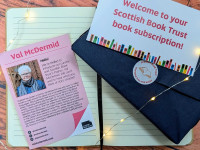
Self-Editing Tips for Writers: Polishing Your Manuscript Like a Pro
rollingstone.com – Friday November 22, 2024

In an era where everyone with a laptop thinks they’re destined for literary stardom, the art of self-editing remains the secret weapon separating the amateurs from the pros. Think of it as the literary equivalent of mixing a track — you’ve got the raw recording, but now it’s time to clean up those frequencies and make it sing.
The first draft is merely the beginning. The real magic happens in revision. But how do you approach editing your own work when you’re too close to see its flaws? Here’s our greatest hits compilation of editing techniques that actually work.
Kill Your Darlings (No Really, Do It)
Writers inevitably fall in love with their more purple passages. But if that beautifully crafted paragraph isn’t moving the story forward, it’s got to go. Create a ‘darlings’ document where you can paste your precious deleted sections. Think of it as having a B-sides album — those cuts might work somewhere else.

6 Magazines for Memoirists
subclub.substack.com – Friday November 22, 2024

I asked the Sub Club-al (…ugh) what list I should make this week and Shannan immediately said memoir because as we know, everyone and their mother is writing a memoir. But that doesn't mean it's easy to find magazines for memoir excerpts or essays. Nonfiction, even creative nonfiction, comes in so many sub-genres and forms that it can be tricky to judge what a magazine means when they say they publish it. The magazines on this list are open to submissions of memoir, and many of them are open to other forms of nonfiction as well, including hybrid forms of personal writing, criticism, and social analysis.

A Bag Full of Trouble: How I Found My Way Into My Debut Novel
lithub.com – Monday November 18, 2024

Bryan VanDyke on the Importance of Spontaneity and Chaos in the Writing Process
Some time ago–a decade at least, but it feels longer–a literary agent read a manuscript that I’d written and told me that she loved it, loved my style, but the book felt too calculated, too much like a math problem. It didn’t lack heart per se, she said, but it felt too much like a clocked thing, too neat.
I carried this criticism around with me for a long time. I did not sell the book that she read, despite a lot of trying, which was disappointing but not all that unusual in the long arc of my writing career to that point.
I had reached a moment as a writer where it was obvious I needed to adjust something, to change my approach in order to get a different outcome. But how does someone whose work is marked by its meditative qualities shed the sense that those qualities are at work without losing, well, everything that makes his voice feel like his own?
I didn’t start a new novel for six years—the longest fallow period of my fiction-writing life. I flirted with and abandoned a few projects, always early in the gameplay of composition. This wasn’t traditional writer’s block. I knew what I wanted to write and how to do it, but that was sort of the problem. The clarity of my intention was a bright sun that burnt off all but what I intended–and I needed something unexpected to take root.
In the spring of 2018 I was on garden leave—a fancy euphemism for laid-off—from my job as a digital strategist at a bank, and I needed to figure out my next professional move. All I really wanted to do was take one more go at novel writing. I was pretty sure that I’d never write a book that got published; still, old habits (and aspirations) don’t go into the night quietly.

Jamie Oliver’s pulped fiction brings shame on British publishers
telegraph.co.uk – Sunday November 17, 2024

The furore surrounding the TV chef’s latest book for children is pathetic – the industry should be fearless, not cowardly
I have in my hands a rare thing. Not an unsigned one, as the old gag goes, but even rarer: an un-pulped one.
For there we’ve been, myself and the oldest of my second crop of children (he’s six) on his bed in the evening reading. It’s a weighty tome but with lots of pictures and endless action. It’s been a break from the norm; a diet of Roald Dahl, The Famous Five, a lot of Paddington and Just William, the latter to which we howl with laughter.
And while he’s quite enjoyed it, I’ve struggled. For Jamie Oliver’s latest tome, Billy and the Epic Escape, does not perform that trick of the greatest of children’s book authors and engage both grown-up and kid. But, then again, I don’t think Roald Dahl ever knocked up a blinding peri peri chicken. Renaissance men are a rarity in this world, so for this Jamie Oliver, chef, restaurateur and campaigner, can be forgiven.
But as we neared the end of the book, news came that what we thought was a safe bedtime adventure turns out to be an atrocious insult, a book of outrageous offence, of gross insensitivity and reckless ignorance.
For there, within those pages, was written something so dire that the book had suddenly been withdrawn from books shops in this country and around the world. Shelves and tables were cleared, vans dispatched to collect the dastardly tomes and great piles in warehouses were removed. Pulped presumably, and then I trust, as Jamie has his finger on the pulse of sustainability, used to help ferment the night soil of developing countries or as fuel to power the schools of the underprivileged.
What was this transgression, this appalling act of insensitivity? And how on earth could it have come from the pen of a guy quite so nice as Jamie?

Fun and useful Christmas gifts for writers
scottishbooktrust.com – Friday November 15, 2024

A few fun ideas for treating the writer in your life this festive season
Picking out Christmas gifts for writers can be tricky. After all, it’s not possible to pop a literary agent or massive book deal under the tree. Luckily, there are lots of other brilliant ideas for making the writer in your life feel special over the holidays. Here are a few of our favourites.
Books about writing
Even the most experienced writers sometimes need a little boost and that’s when books about harnessing creativity or examining the writing process are perfect. We’ve gathered together a few great suggestions in our writing about writing book list. I can also guarantee that if you walk into your local bookshop and ask what the staff recommend, they’ll be able to pick out something inspiring for you.

'Three Women' Writer Lisa Taddeo Offers 3 Writing Insights Every Aspiring TV Writer Should Know
screencraft.org – Thursday November 14, 2024

In ScreenCraft’s new interview with author and showrunner Lisa Taddeo, we dive into the art of adaptation and screenwriting. The writer recently brought her acclaimed book Three Women to the screen, and she has quite a few things to teach us about her process.
The Starz series features Shailene Woodley, Betty Gilpin, DeWanda Wise, and Gabrielle Creevy, and it’s based on Taddeo's bestselling exploration of desire, intimacy, and vulnerability. In the show, an author (Woodley) tells the complex stories of three women as they navigate the highs and lows of love and life.
It’s nonfiction—a true depiction of these women’s relationships and (at times, shocking) sex lives.

First Person: My journey to writing a children’s book
algonquintimes.com – Sunday November 10, 2024

Over seven days, I put my dream of writing a book for kids into motion. The adventure taught me I can do more than I ever thought I could
“No, Auntie! Don’t go!” Kavaiah’s sweet voice stops me just as I’m about to step out the door. She tugs at my hand, holding tight to a new book I bought her, I Am Born to Be Awesome by Mechal Renee Roe. “Just read the book one more time, Auntie, PLEASE!” she begs, her eyes wide. How can I not be compelled to stay?
I smile, settle back onto the couch, and she jumps into my lap, eagerly flipping the book open to the first page. Kavaiah is full of energy when we read. She acts out each line, her four-year-old voice rising and falling with each word, making faces and gestures, soaking in every picture and phrase like it’s her first time hearing them.
I start, “I love the stars,” and she shouts, “I love racing cars!” Then we both chime in, “I am born to be awesome!” She takes her time turning each page, determined to slow me down if I go too fast. With every line, she finds something that resonates, whether it’s her love for bath time or playing in the park. She’s not just listening; she’s living each rhyme, seeing herself in the words and pictures. Each time we reach “I am born to be awesome,” she beams, and I feel it too. Her high-pitched voice makes my heart melt.
I never imagined that enrolling in Algonquin College’s journalism program would lead me to begin to write a children’s book. When the opportunity to write a personal narrative arose, I thought, why not take it further? Why not challenge myself to write a children’s book in seven days? I naively thought it wouldn’t be too hard, after all, it’s a children’s book. How complicated could it be?
Well, as it turns out, it was more challenging than I anticipated.

On the benefits of working slowly
thecreativeindependent.com – Thursday November 7, 2024

Caoilinn Hughes discusses writing as a process of discovery, being a monotasker, and the importance of wisdom in producing good work.
You’ve had a very international life. You grew up in Ireland, where you studied literature and drama. You subsequently lived in New Zealand, where you earned a PhD in English literature, and in the Netherlands, among other countries. Could you describe your path to becoming a writer?
I was always writing, even when I was a kid, aged nine, ten. As a teenager, I wrote a lot of poems, as that’s really what I read. I read poetry and plays, because I was a very slow reader. It felt like a very intimate interaction. There’s all this blank space around the work, and it seemed to invite a direct conversation between the author and the reader. An activity, rather than something that you receive passively.
I went to the North of Ireland to study at Queen’s University Belfast, partly because I didn’t have the grades to go to college in the Republic. And also, a lot of the poets I was reading were from the North, so it felt fated to go there.

Pantser vs. Plotter: Authors Debate the Best Approach to Writing
booktrib.com – Saturday November 2, 2024

In another life, I’m a writer who meticulously plans out the entire trajectory of my book before I even touch my fingers to the keyboard. When I sit down to work, I refer to the chapter outline I created, which maps out every beat of the story.
So straightforward! So elegant!
Unfortunately, that’s not my approach. My muse-dependent technique is what’s known as “pantsing,” or flying by the seat of my pants, and if I could change it I one-hundred percent would. Sometimes, the end of the chapter means the beginning of a crisis while I struggle to figure out what’s supposed to happen next?
The other side of the writing equation, being a “plotter,” is tougher during the initial drafting stages since it requires the writer to conceptualize every twist and turn before starting, but it ensures a more predictable writing process as the narrative unfolds, and easier editing.
I’ve tried outlining, but my biggest issue with it is I feel disconnected from the story if I don’t let it unfold naturally. I’ve found that outlining limits the serendipity I crave when I’m immersing myself in the writing process. I love it when my characters surprise me, which happened quite a bit as I worked on my last novel, Unleashed Holiday.

The Heartbeat of Suspense: Mastering Pacing in Thriller Writing
rollingstone.com – Friday November 1, 2024

In the pulsating world of thriller fiction, pacing is the silent conductor, orchestrating a symphony of tension and release that keeps readers perched on the edge of their seats. It’s the art of manipulating the reader’s pulse, accelerating it with bursts of action, then allowing brief moments of respite before plunging back into the maelstrom. This delicate balance is what transforms a good thriller into an unputdownable page-turner.
The Anatomy of a Thriller’s Pace
At its core, effective pacing in thrillers is about managing the ebb and flow of tension. It’s akin to composing a piece of music, where crescendos of intensity are balanced with quieter passages, each enhancing the impact of the other. This rhythmic variation is crucial in maintaining reader interest and engagement throughout the narrative.
Hooking Readers from the Start
Many successful thrillers begin in medias res — in the middle of the action. This technique immediately immerses readers in a high-stakes situation, grabbing their attention and setting the tone for the rest of the novel. The opening pages serve as a promise to the reader, a taste of the thrilling journey that lies ahead.
Get the free newsletter | Submit a news item or article | Get Writers' News for your website





